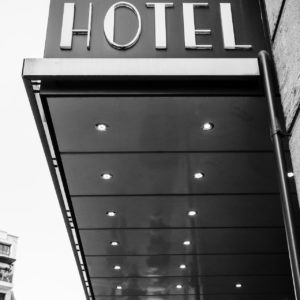Hotels Can Beat Airbnb
Without a doubt, the sharing economy shifted the marketplace landscape. Its rise disrupted various verticals.
For example, Uber redefined ride sharing. SpotHero rethought navigating parking. And Airbnb reinvented lodging.
Last year, Statista valued Airbnb at $38 billion. Other sources tout Airbnb’s compound growth rate at 153% over the last decade.
With more than 150 million users and more than 6 million listings world-wide, Airbnb is a competitor for hotels globally.
According to research from the School of Hospitality Administration at Boston University, since Airbnb’s founding, revenue per available hotel room fell by 2% in 10 major American cities.
Overall, economic projections show the sharing economy growing to $335 billion by 2025.
Reasons range for the sharing economy’s popularity. The sharing economy allows participants to leverage traditionally unused asset utility, harness sustainability, and gain from convenience.
Millennials, significant users and shapers of the sharing economy, will make up 75 percent of the workforce by 2025. Intuitively, millennials’ purchasing power will simultaneously shift.

As one competitive measure, hotels continue to implement or consider home sharing strategies.
For example, Hyatt ditched an initial plan to establish a home sharing brand. Marriott International, however, launched the Homes & Villas brand.
Travel research firm Phocuswright says consumers prefer hotels over other accommodations by a two-to-one ratio. Given this, the consumers that prefer hotel accommodations, likely prefer the “cleanliness, security, and amenities” offered by the hotel-branded homes.
It’s estimated hospitality owns 17.5 million hotel rooms worldwide. Additionally, hotels formed the hospitality industry. So how can hotels remain competitive without completely ditching their identity and established assets?
The answer. Concentrate on the consumer majority preference for experience and brand relationship.
This is particularly important for two reasons.
1) Travel outranks many other experiential opportunities amongst consumers.
2) Millennials, a generation with slated major purchasing power, value experience and brand relationships.
To empower staff to be able to focus on the customer and provide the best possible experience, many hotels now leverage automation in their back office.
Automating hospitality’s back office enhances efforts in the front office that focus on experience.
It allows hospitality to shift its human workforce to the front office – a natural value-add. There’s no better way to build relationship and bolster consumer experience than through direct human interaction?
Automating back office operations, from billing a group to distributing tips and gratuities to reconciling credit and cash, is a smart decision for front office operations.
Aloft Chicago Mag Mile, an early automation adopter, leverages back office automation to elevate consumer experience.
“Automating Aloft Chicago Mag Mile’s back office allows us to focus more on what’s most impactful – interacting with our guests face-to-face,” said Aloft Chicago Mag Mile General Manager, Liz Kraft. “These face-to-face moments allow us to create lasting memories, form bonds, and exceed customers’ expectations.”
By empowering its staff with automation to provide top-notch service, Aloft Chicago Mag Mile also cultivates a brand relationship with its consumers.
Ultimately, automation propels brand experience and relationship. By cultivating these consumer preferences, automation transforms hotels into home sharing’s most ambitious competitors.
With automation, hotels can compete with Airbnb.

